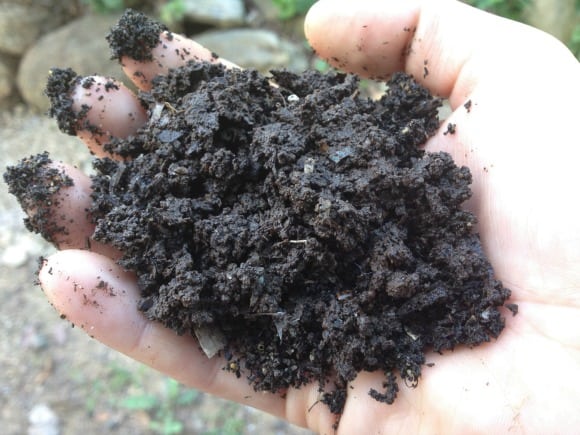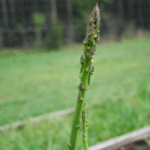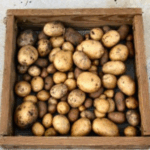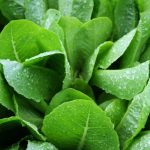Worm composting, or vermicomposting, is on my list of “things to try in 2016.” I love the idea of a small, compact composting system using nature’s perfect recyclers: worms! To learn more, I decided to go to the source. No, not a worm…but book author and worm composter, Henry Owen. Henry was gracious enough to participate in an interview with me about his new book and share his knowledge. So without further ado, please meet Henry Owen.
Worm Composting: An Interview with Book Author and Worm Composer Henry Owen
Home Garden Joy (HGJ): Tell me about yourself. How did you get involved in worm composting?
Henry Owen (HO): I started worm composting while working for Friendship Gardens (www.friendship-gardens.org). Friendship Gardens’ mission is to grow food that is used in a meals on wheels program. Part of my job was to compost all the food scraps that came out of the meals on wheels kitchen. I needed a way to compost a large volume of food scraps and produce excellent fertilizer for our gardens. Worm composting was the answer! We composted over 25 lbs of food scraps per day using several large flow-through style worm bins.
HGJ: Why do you like worm composting?
HO: I love worm composting because it gives me an opportunity to take responsibility for the organic waste that comes out of my kitchen. It is a natural process that relies on worms to do what they do best: eat, poop, and make babies. Plus, I get great worm compost fertilizer out of it!
Worm Bin DIY
HGJ: Where do you keep your worm bin?
HO: I currently have two worm bins. One is a Worm Factory, the other is a Hungry Bin that I got recently and am really excited about trying out long term. Both are kept on my backyard covered porch out of the sun and rain.
HGJ: Can you use worms from the garden or a bait shop to get started? Why or why not?
HO: The best suited and most used earthworm for worm composting is the red wiggler worm. In the wild, the red wiggler does not live down in the soil but rather in the first couple inches of leaf litter or rotting wood. You can gather red wigglers for your bin but it is really tough to get enough for a good start to a worm bin. You can also purchase them at a bait shop but you will pay a lot per worm because bait shops don’t sell in high quantities. To get started, I recommend purchasing one pound of worms from a professional worm grower online. They can be shipped to your door in moderate weather.
HGJ: Are worm bins a lot of work?
HO: Nope, but they do take some work. Cumulatively, I probably spend around 1 or 2 hours per month on my worm bins depending on the season. So no, it doesn’t take much work but it does take some. Beginner worm composters should think of it as a hobby, not just a place to throw waste.

Feeding Worms
HGJ: What can you feed worms? Do they need water too?
HO: Worms prefer a vegetarian diet. Feed them uncooked food scraps from your cooking preparation: banana peels, apple cores, coffee grounds, etc. For a more complete list check out my webpage What to Feed Red Wiggler Worms. Worm bins do need water. Worms breathe through their skin and their skin must be moist in order for them to breathe. Worm composters should use a spray bottle to ensure that the worm bin bedding stays moist.
HGJ: How do you extract the castings or compost without messing up the worm’s habitat?
HO: How you harvest worm compost depends a great deal on the style of worm bin that you are using. Fancier flow-through style worm bins make it easy to harvest by relying on red wigglers natural tendency to stay in the top few inches of bedding. Worm compost in these worm bins is removed from the bottom tray or area of the bin and should be free of worms. The quickest and easiest way to harvest worm compost from any bin is simply to reach down to the bottom, pull out a handful of worm compost, and then pick out the worms to return to the bin. For more in depth harvest info read my article: How to Harvest Worm Compost
Tips for Successful DIY Composting with Worms
HGJ: For someone just starting out, I recommend your book as a first step. What other steps or tips can you give a newcomer to worm composting?
HO: The most important thing is to just start. If you want to give worm composting a try, do it, don’t let fears or concerns hold you back. Read my book, experiment, ask questions, there are lots of ways to learn the art of worm composting. And remember, you are working with the worms, encouraging them to do the three things they do best: eat, poop, and make babies!
HGJ: What other tips can you give newcomers to worm composting?
HO: Don’t overfeed. Most of the issues that newcomers run into are caused by adding too much food to the worm bin too fast. Take it slow. Feed your worms again only when they finish their previous meal.
BUY THE BOOK
You can purchase Henry’s book, How To Start A Worm Bin, on Amazon.
Please note that Home Garden Joy participates in the Amazon affiliate program. We make money from your purchase when you use the link, above. Thank you for your support of Home Garden Joy.








[…] Worm Composting […]